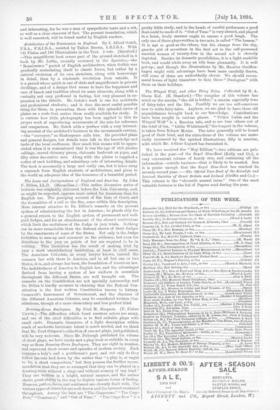The Laws and Jurisprudence of England and America. By John
F. Dillon, LL.D. (Macmillan.)—This rather discursive series of lectures was originally delivered before the Yale I7niversity, and, as might be expected, appears more suited for American than for English use, The gossiping account of the Inns of Court, and the formalities of a call to the Bar, come within this description. More interest attaches to Dr. Dillon's remarks on the present system of administering the law in America ; he pleads ably for a general return to the English systeni of permanent and well- paid Judges, and for an abandonment of the absurd restrictions which limit the usefulness of the Judge in jury trials. Nothing can be more remarkable than the distrust shown of their Judges by the enactments of some of the States. Not only is the Judge forbidden to sum-up and comment on the evidence, but even his directions to the jury on points of law are required to be in writing. This limitation has the result of making trial by jury a most unsatisfactory institution, at least in civil cases. The American Colonists, as every lawyer knows, carried the common law with them to America, and in all but one or two States, it is, and always has been, the foundation of American law. The indebtedness of America to English law, and the advantages derived from having a system of law uniform in essentials throughout the different States, are well brought out. The remarks on the Constitution are not specially noteworthy, and Dr. Dillon is hardly accurate in claiming that the Federal Con- stitution is the first written Constitution known to history. Cromwell's Instrument of Government, and the charters of the different American Colonies, may be considered written Con- stitutions, though of a more elementary and less perfect kind.


































 Previous page
Previous page